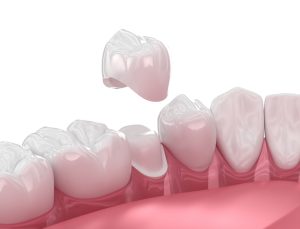Porcelain Dental Crowns in Centuria, WI
Do You Need a Porcelain Dental Crown?
Porcelain dental crowns are an excellent choice for restoring and enhancing the look of teeth that are damaged, discolored, or misaligned. Dental crowns have assisted numerous patients in achieving the durable, beautiful smiles they desire.
Find out more about porcelain crowns with our Centuria, WI dentist at River Birch Dental, and discover how they can help you reclaim your stunning smile by calling (715) 646-2161.
What Are Porcelain Crowns?
Porcelain crowns are designed to cover the entire visible part of a damaged tooth. They are custom-made to align with the size, shape, and color of your natural teeth, restoring both functionality and aesthetics to your smile.
Porcelain is a ceramic material that closely mimics the color and translucence of natural tooth enamel. It is especially favored for its visual appeal, particularly for front teeth or any teeth visible when you smile or talk.
Types of Porcelain Crowns
- Full Porcelain/Ceramic Crowns: Made entirely of porcelain, these crowns provide the best natural color match and are often ideal for individuals with metal allergies.
- Porcelain-fused-to-metal (PFM) Crowns: These crowns have a metal core with a porcelain exterior, combining the strength of metal with the aesthetics of porcelain. However, the metal may occasionally appear as a thin dark line at the gum line.
Benefits of Porcelain Crowns
Porcelain crowns offer numerous advantages, such as:
- Durability: Known for their strength, porcelain crowns can withstand the daily wear and tear of chewing and speaking.
- Aesthetics: Designed to mimic the look of natural teeth, porcelain crowns seamlessly blend with your existing teeth for a natural-looking smile.
- Stain-Resistance: Porcelain resists staining, ensuring your crowns remain bright and white over time.
- Versatility: A porcelain crown can address various dental issues, from chipped and cracked teeth to misshapen or discolored teeth.
Drawbacks of Porcelain Crowns
Despite their many benefits, porcelain crowns have some drawbacks, including:
- Cost: Porcelain crowns may be more costly than other dental restorations, such as composite fillings or metal crowns.
- Sensitivity: Some individuals might experience increased sensitivity after receiving a porcelain crown.
- Potential for Chipping: While durable, porcelain is not indestructible and can chip or crack if subjected to excessive force or trauma.
The Porcelain Crown Process
Consultation and Evaluation
During your appointment, your Centuria, WI dentist will evaluate your teeth and discuss your treatment goals and options. They may take X-rays or impressions to aid in treatment planning.
Tooth Preparation
After deciding with your dentist that porcelain crowns are the best option, the next step is to prepare the affected teeth. Dr. Vargas will remove any decay or damage and shape the tooth to fit the crown, possibly removing some enamel from the tooth’s surface.
Impressions
Once the tooth is prepared, an impression or mold of the tooth is taken. This impression is used to create a custom-fit porcelain crown that matches your natural tooth’s size and shape.
Temporary Crown
While your custom crown is crafted in a dental lab, your Centuria, WI dentist will provide a temporary crown to protect the prepared tooth and maintain your bite and alignment until the permanent crown is ready.
Crown Placement
When your custom porcelain crown is complete, you’ll return to the dentist’s office for the final placement. Dr. Vargas will remove the temporary crown and place the permanent one, making any necessary adjustments for a comfortable fit and natural appearance.
Follow-Up
After placing the porcelain crown, schedule a follow-up appointment to ensure proper function and to address any sensitivity or discomfort. With appropriate care, your porcelain crown can last for many years.
Porcelain Crown Alternatives
Choosing the right dental treatment depends on your specific needs, aesthetic preferences, and budget. Here are some alternatives:
 Composite Resin: A tooth-colored filling material used in some cases instead of a crown. While more affordable, composite fillings may not offer the same strength and durability as crowns.
Composite Resin: A tooth-colored filling material used in some cases instead of a crown. While more affordable, composite fillings may not offer the same strength and durability as crowns.- Gold Crowns: An enduring material for dental crowns, gold is durable, non-abrasive, and requires less tooth reduction than porcelain or porcelain-fused-to-metal crowns. Some prefer gold for back teeth, while others dislike the metallic look.
- Zirconia Crowns: Known for their strength and durability, zirconia crowns are tooth-colored and metal-free, ideal for those with metal allergies or sensitivities.
- CEREC® Crowns: This system allows for the design, fabrication, and placement of a crown in one visit using CAD/CAM technology, also known as same-day crowns.
- Onlays or Inlays: These replace only a portion of the tooth and can be made of porcelain, gold, or composite resin, suitable for teeth not needing full coverage.
- Dental Veneers: For front teeth with aesthetic issues, veneers offer a more conservative alternative. They’re thin porcelain shells bonded to the front surface of teeth to enhance their appearance.
Frequently Asked Questions
With proper care, porcelain crowns can last 10 to 20 years. Their lifespan depends on factors like oral hygiene, diet, and wear and tear. Porcelain crowns are renowned for their durability and longevity.
Porcelain crowns can be pricier than other crowns and dental restorations due to the high-quality materials and custom crafting involved. Costs vary based on case complexity, the number of crowns needed, and the dental practice’s location.
Not at all. Your dentist will use a local anesthetic to numb the area, ensuring comfort during the procedure. Post-procedure, you may experience some sensitivity or soreness, which should subside within a few days.
